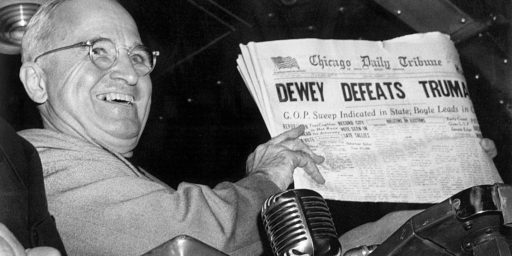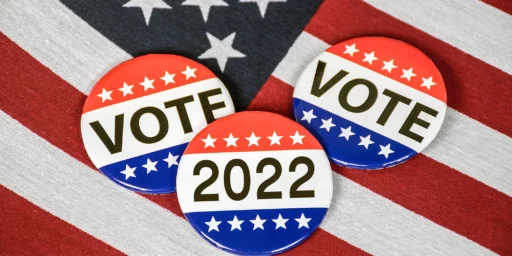Were the Election Outcomes Truly Unexpected?
Thinking about what was likely and what wasn't.

So, I have been thinking quite a bit about the elections (not surprisingly) and so exactly where to start is a challenge, especially given my lack of output of late. Indeed, the lack of output is worth noting because it probably has influenced how I have been thinking about the results (i.e., I think I am less influenced by the immediate drama leading up to Election Day). Because of a visit from my sister and then traveling for a conference, I have been otherwise occupied during times I might have been writing. And, indeed, not only have I rather obviously written less, I have been consuming less coverage of the elections than I might have otherwise (granted, still far more than a normal person, but not quite at my election-nerd levels). Indeed, retrospectively it is kind of ironic that I was in Washington, DC (mere blocks from the White House and Capitol) much of last week, but was largely not paying more than passing attention to the build-up to the elections.
I also will confess to going into election night with sufficient trepidation, especially about the prospect of election deniers winning at the state level in potential battleground states, that I was less enthused than normal about watching returns. I also had (and still have) a real fear of a wave of unqualified persons ascending to the Senate. Thankfully, it appears that key Secretary of State races have not gone to election deniers and we know that in Pennsylvania the election-denying Mastriano lost the governor’s race and there is a decent chance that Arizona will have a similar outcome (but that is yet to be determined).
Some may confuse my concern about people like Dr. Oz, J.D. Vance, and especially Herschel Walker becoming US Senators with mere partisan preferences, but this is not the case. Oz and Vance are hucksters (to put it kindly) and Walker is morally and intellectually unfit for office (he may be the least capable candidate I have ever seen who also has a real chance of winning office). There were other candidates of concern, but those three stick out, and have from the beginning. Oz lost, Vance won, and Walker faces a runoff, so those concerns are far from gone.
More to the point, democracy can not persist if huge chunks of voters don’t believe that voting is free and fair, and if leading members of a political party are actively running on such propositions it is flatly dangerous. Likewise, democracy (and just basic governance) is threatening when elected officials are unprepared buffoons (not to put too fine a point on it). Look, I have observed and studied politics long enough (and have met politicians of various stripes at various levels from multiple countries) so I hardly think that they are all paragons of intellect and virtue. But there needs to be a basic level of competence and professionalism in elected government or else we are all doomed. So it is concerning when a significant number of candidates seem to either truly believe in unreality or (perhaps worse) are willing to promote unreality in a cynical ploy to win votes.
Ok, so what is the point of this post? (Or, at least, what is that I thought I was going to write when I started?). It is that despite the current narrative that I am seeing in the press (broadly defined) is that the results, at least at the macro level, are not all that unexpected.
Now, to understand what I mean, I would note that there is always a slow, steady analytical approach to elections (like if one looks daily at the FiveThirtyEight model or even just more dispassionate analyses like the Cook Report) and then there is The Horserace Narrative(TM) that is all about the horserace. The Horserace Narrative is driven by the need for clicks and eyeballs.
I watched maybe five minutes of ABC’s coverage on election night and was struck by the giddy excitement of the whole crew as they were talking about early results from Florida. They were excited to have a story, in this case a really good night for DeSantis and the GOP. (This was, to me, yet another reminder that the MSM is not biased towards the Democrats, they are biased towards having something to talk about).
I will confess to, in general, having grown weary of the way cable news covers politics in general, so that also influenced my lack of consumption on election night (plus knowing that we likely wouldn’t know that races that matter immediately anyway).
At any rate, my approach has been to wait and see how the results shape up. Now, I will admit that the night (and subsequent week) has shaped up better for the Democrats than it seemed was the case being made by the media narrative immediately before the casting of ballots. And, let me firmly acknowledge that the polling and other indicators seemed to suggest that things were turning more Republican than the trends had been back in the summer.
But I will remind everyone that things like the generic ballot don’t take into consideration pesky things like how the districts are drawn (or, put another way, how voters are segmented by structure).
There are some clearly surprising outcomes (such as the fact that Lauren Boebert could actually lose her seat) or that there is still an outside chance that the House remains in Democratic hands (although this remains highly unlikely and should it end up doing so, would cause me to reassess some of what I am saying in this post). I would also note, that if Nevada and Georgia go R (which is quite possible), a lot of the euphoria on the D side evaporates. Further, Republican strength in New York was a surprise, as was the overwhelming success of DeSantis in Florida.
At any rate, one of the post-election narratives I have noted is that the outcomes on Tuesday defied expectations.* I am not so sure this is entirely true. I think the outcomes defied the fears of many Democrats, but the long-term expectations were not that off the mark.
What were some key, long-term expectations going into this election?
- Republicans would almost certainly gain seats and win the House. I noted this in a January 2022 post: 2022 is a Midterm Year. (And back in August, CBS projected a seat count not unlike what we might end up with).
- That the map favored Democrats more than previous maps. I noted this back in April: A “Fairer” Map for the 2022 House? Again, it is worth stating that district lines are the single most significant variable in understanding our electoral outcomes. Yes, other things matter, including candidate quality, but not anywhere near as much as the Horserace Narrative suggests.
- The Senate was likely to come down to AZ, GA, NV, and PA. This was noted in July: Looking to the Senate Elections.
In summary, the House going R, but not overwhelmingly, and the Senate barely staying D has been the baseline assumption for most of the year (if not the last two years). So while I know that a lot of Democrats feared a “bloodbath” (as a friend predicted to me last week) that was as much about vibes and media narrative as was anything else.
And, I would note, the basic structure of the outcome is based on analysis that doesn’t have a ton to do with Trumpism nor even candidate quality (although those are both discussions worth considering, and that I will no doubt return to).
Now, some things that I think will require more analysis: the Democrats appear to have done much better than historical trends would expect in governor’s races and I think that the defeat of election deniers for Secretary of State offices needs more analysis. It also appears that turnout was higher than a typical mid-term.
And, I would caveat all of this to suggest that we don’t have full results yet, so all analysis is tentative.
Still, I am struck by the narrative progression:
-Late summer/early fall: Democrats are doing MUCH better than expected, and Dobbs and the January 6th Commission will lead the way!
-Leading up to Election Day: Republicans and surging and a Red Wave may be coming!!
-Wednesday morning: No Red Wave! Dems over-perform! Celebrate good times (if you are a D) and woe is us (if you are an R).
If over the weekend Nevada goes to Laxalt and the AZ governor’s race goes to Lake, the narrative will be revised in an R-ward direction, but if Laxalt loses (and Kelly wins in AZ, as I expect he will), there will be jubilation over the Senate (else the drama over the GA Senate run-off will be intense). But none of that is especially beyond where we thought we would be back earlier in 2022, despite the narrative’s flow. (Put another way, if you had gone into a coma in August and just woke up today, you would not be especially surprised by the results–heck, if you had gone into a coma in April, same deal–once we knew the House map post-redistricting, the basics of the race were in place).
Now, again, if the Ds hold onto the House, which is possible but highly unlikely, we can talk about a serious reexamination of where we are. And while I think that Senate stays D, that could change and if it does go R, the vibes will shift.
*This was the clear tone of The Daily‘s post-election contest, but that is what happens when you have to record an immediate reaction podcast at 2am.






It’s tempting to draw a narrative that encompasses and explains what happened nationally. But that won’t work as the explanation lies in the details of individual races or within a state. A good example is NY. Wednesday the Times had an article to the effect that if Dems lost the House, NY was to blame. The backstory is that the NY constitution has a provision for fair political districts, but in redistricting, the Dem legislature got greedy and was slapped down by the state courts. The courts then imposed their own district boundaries, that were far more balanced that what may have been allowed, if the Dems hadn’t been so greedy.
Lauren Boebert, fighting for her political survival is another example, while the fact that DeSantis only exceeded Rubio’s winning percentage by a couple of points, indicates that DeSantis’s win, may not be as impressive as it seems.
I did not make any predictions this year because my assessment was there was way too much uncertainty and that any prediction would basically be a guess.
The reality is that a lot of election forecasting is not driven by objective data or good objective data. All we really have for objective measures are polls that always come with wide error margins, even when there isn’t the increasingly difficult problem of trying to achieve representative samples through more sampling or massaging the data.
And this cycle, polling was more concentrated – assumptions were made about some contests, and polling was either not done, or not done sufficiently well, to really know what would happen – this is why Boebert’s weak showing is a “surprise.” The going assumption was that she’s in a red district, so would win easily, and therefore, polling resources should not be spent there.
I’m going to wait until all the numbers are crunched before determining how accurate polling was for this cycle. It seems it was pretty good (meaning within the margin of error, which is large and therefore not amazing prognostication) in most cases, but there were some outliers.
For your late summer narrative, I think that came across at the time a lot like the way the narrative that the Washington Commanders are headed to the Super Bowl when they do well in a given exhibition game or practice. There was a little hopefulness, with a lot of strings of well wishing that went with it. I didn’t really take that as a serious narrative.
I think there is the historical narrative and then this particular election. On an historical basis I think you expected the Rs to have a big win. The out party usually wins and inflation was high. What made this one unique and hard to predict was that one man was effectively able to choose so many candidates and he chose them without regard to quality or electability. Even in the days when candidates were chosen in the smoke filled rooms I think it was still a committee making the choices.
Steve
IMHO …unquestionably worse…
A really good night for Gretchen Whitmer, who flipped the Michigan statehouse on her coattails, was also something to talk about, but so far that’s not getting nearly the same attention that is going to DeSantis. I suspect the correct framing of MSM bias is having something salacious to talk about. Trump has leveraged that bias for mountains of free campaign exposure since he came down the elevator and now the MSM is getting all excited about a Trump/DeSantis cage match. Meanwhile, good governance gets ignored.
Granted I limit myself regionally, but I think I’ve been pretty consistent in my position that in the American West, the gradual shift towards the Democrats would continue overall, and that AZ was at or near a tipping point. Quite a few people currently think the western Dems will hold all of their Senate seats, win one governor’s office while losing another. Will take a while for results for the US House and state legislatures to all come in. My “stretch” outcome for a “Dems crushed it in the West” scenario was AZ flipping to a blue trifecta, but that looks unlikely right now.
I have a question that’s a bit OT. Ignore it if you like.
It’s not that I dispute Steven’s overall thesis of “structure holds the lion’s share of explanation for electoral outcomes”. It’s that I more wonder, “So what in tarnation is happening in Florida?” The state has be steadily shifting redward for the last 20 years? Why is that? I mean it looks like people’s minds are changing, but the thesis says that doesn’t happen much. So what is it then? R’s moving to Florida? That’s plausible, but do we have, you know, evidence?
@Jay L Gischer: Good question. As a resident of FL, I have no idea. There’s the unusually high rate of U-Haul arrivals, but I would have thought that would push the other way.
@Jay L Gischer: My first hypothesis would be, “They’ve gotten steadily better at selective voter suppression.”
Explanations I have heard:
More Hispanics there are right-wingers.
In places where there has been more Hispanic immigration for longer, more of them are now second and third generation people. This means that they are no longer voting for an immigrant-friendly party.
The old white people moving to Florida are no longer New Deal/FDR/JFK/LBJ people, but MAGA’s.
@Michael Cain:
What is the evidence for that? It would have to be some massive voter suppression to account for the shift. Charges are voter suppression are very serious and need to be backed up by serious evidence.
The most likely answer is that Florida is changing like other states are. Our state used to be red, then purple and now it is blue. Ohio used to be blue, and now it is red. Things change. There is a major shift in the parties going, particularly with educated and working-class voters. That is going to change the dynamics at the state level.
@Andy:
Indeed, this would be the place to look to answer the question about Florida. Plus, the shift has been ongoing for some time.
The panhandle is very much in line with the rest of the Southeast and there is the Cuban vote to contend with as well, which I believe has shifted back to the R side after some flirtation with the Ds.